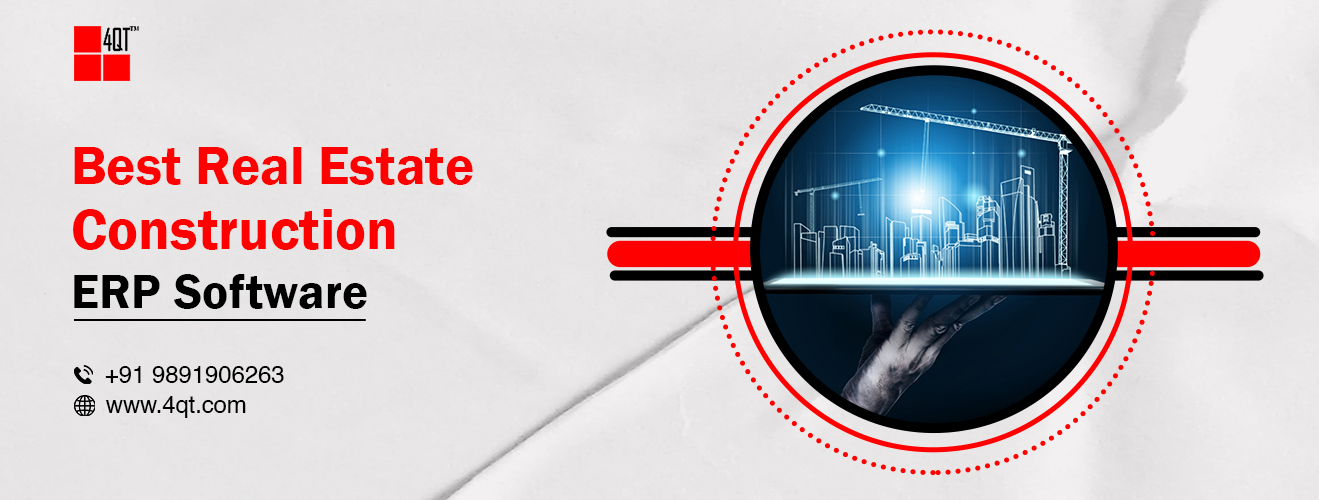Table of Contents
In the dynamic landscape of the real estate and construction industry, efficiency, transparency, and seamless project management are paramount. To meet the evolving needs of this sector, Real Estate Construction ERP software has become a game-changer. Among the myriad of options available, 4QT stands out as a leading provider of Construction ERP software in India.
In this comprehensive exploration, we delve into the key features and benefits that position us as the go-to solution for businesses seeking top-tier ERP software for construction industry in India.
Understanding the Landscape
The construction industry in India is witnessing unprecedented growth, accompanied by increased complexity in project management, resource allocation, and compliance requirements.
Real Estate Construction ERP software has emerged as an indispensable tool to streamline operations, enhance collaboration, and ensure optimal utilization of resources. Among the variety of options, 4QT has established itself as a reliable and innovative provider of ERP solutions, specifically designed to address the unique challenges faced by the construction sector in India.
Key Features of 4QT’s Real Estate Construction ERP Software
Comprehensive Project Management:
Our ERP software for construction industry in India excels in providing comprehensive project management capabilities. From project planning and scheduling to resource allocation and progress tracking, the software offers a holistic view of the entire project life cycle. This ensures that construction companies can efficiently manage multiple projects simultaneously, optimizing timelines and resources.
Financial Management and Compliance:
Navigating the financial intricacies of construction projects is simplified with our construction ERP software India. The platform integrates robust financial management tools that facilitate budgeting, cost tracking, and invoicing. Moreover, it ensures compliance with industry regulations and statutory requirements, minimizing the risk of penalties and legal complications.
Supply Chain and Procurement:
Efficient procurement is a critical aspect of construction projects, and our construction procurement software addresses this with a powerful supply chain and procurement module. The platform streamlines the procurement process, from vendor selection to material acquisition, ensuring that construction companies can optimize costs and maintain a smooth flow of resources.
Collaborative Communication:
A building project’s success is largely dependent on effective communication. ERP software facilitates seamless collaboration among project stakeholders, including architects, engineers, contractors, and clients. The platform offers a centralized communication hub, ensuring that all team members are well-informed and can contribute to decision-making processes in real-time.
Document Management:
The construction industry involves an extensive array of documents, from blueprints and permits to contracts and compliance documents. Our construction ERP India provides a robust document management system, ensuring that all relevant documents are organized, accessible, and easily traceable. This feature not only enhances efficiency but also mitigates the risk of errors and delays associated with document handling.
Mobile Responsive Accessibility:
Recognizing the mobile nature of construction projects, our ERP software is designed with mobile responsive accessibility in mind. This allows on-site teams to access critical project information, update progress, and communicate with the central system in real-time, fostering agility and responsiveness.
Benefits of Choosing 4QT’s Construction ERP Software India
Tailored Solution:
4QT’s ERP software is specifically tailored to meet the unique challenges and requirements of the construction industry in India. This localization ensures that the software aligns seamlessly with the regulatory framework, business practices, and market dynamics prevalent in the Indian construction sector.
Scalability and Flexibility:
Construction projects vary in scale and complexity, and our construction ERP software India is designed to accommodate the diversity. The platform is scalable, allowing businesses to adapt and expand their usage as projects evolve. Additionally, the flexibility of the software ensures that it can be customized to suit the specific needs and workflows of individual construction companies.
Cost Efficiency:
Our Construction ERP software India is a cost-effective solution that provides a high return on investment. By optimizing project management, resource utilization, and procurement processes, construction companies can realize significant cost savings throughout their projects.
Enhanced Decision-Making:
The real-time visibility and data analytics capabilities of our construction ERP India empower construction companies with valuable insights. This enhanced visibility enables informed decision-making, allowing businesses to proactively address challenges, capitalize on opportunities, and optimize project outcomes.
Conclusion
In the realm of Real Estate Construction ERP software , 4QT stands out as a reliable and innovative solution tailored to the unique needs of the construction industry. With its comprehensive project management, financial oversight, collaborative communication, and mobile responsive accessibility features, its ERP software provides a robust platform for businesses seeking efficiency, transparency, and success in their construction projects.
Choosing 4QT ensures not only compliance with industry standards but also a strategic advantage in navigating the complexities of the ever-evolving construction landscape in India.


